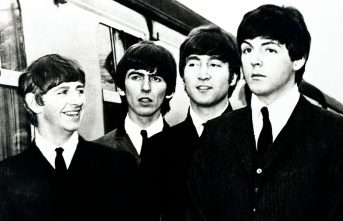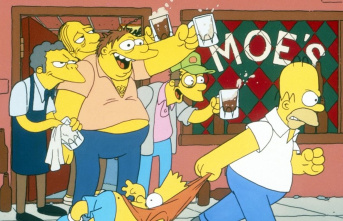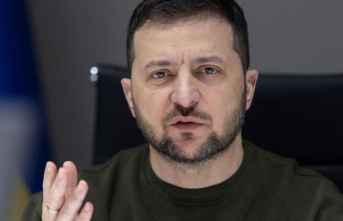Steven Gätjen met Boris Becker for the Sat 1 exclusive interview in freedom. How exactly this combination came about in the first place remains open, the two are probably close and it was certainly important for the ex-tennis player to be questioned by someone who is basically well-disposed towards him. Even Gätjen's introduction that Boris Becker was the "most famous prisoner in the world" gave an idea: Both are laying it on thick, after all, a mood has to be created for the only interview so far with the tennis legend after his deportation to Germany.
Boris Becker has been "a free man" for almost a week now, as he has called himself several times, and he seems different. In order to show this better, Gätjen Becker had two photos looked at, one showed him shortly before entering prison, one was a photo taken during the interview. Becker should answer what has changed. Now that he has been in prison, he is "perhaps a little smarter, a little more humble" and also a little healthier. In eight months and six days, the former athlete had no alcohol, no cigarettes and, for the first time, a feeling of hunger. He "ate little for weeks, months," mostly rice or potatoes with sauce, sometimes a piece of chicken at the weekend. "It was good for my health," Becker draws a balance on a purely physical level.
Mentally he seems to be shattered, several times in the interview he struggled for composure and asked for a moment to collect his thoughts. That was very understandable, the whole situation is not easy even for a media professional like Becker. And yet it was sometimes difficult to completely relieve him of the purification. Because when asked if he was guilty, Becker responded with "of course I was guilty", but then added that the jury in London had found him guilty. Boris Becker sees the verdict of the judge, who accused him of lack of remorse, less critically, it also doesn't fit well into one's own image to admit that one has perhaps not dealt with one's own mistakes so profoundly.
"She had no choice," said the ex-tennis player, in his opinion the judge had to order a prison sentence due to the jury's guilty verdict, the addition with the lack of remorse, which in his eyes was more of a standard phrase. He would have done everything he could in court, Becker explained, only to complain that he said half the jury was made up of people under the age of 30. "They didn't even know who Boris Becker was," he said. But something like that, one would like to interject, shouldn't that also be completely irrelevant when an indictment is discussed? With some of his statements, Becker exemplified what many seem to believe: the belief that celebrities could expect lighter sentences in court just because they are famous. Everyone should be equal in court. Becker did not want to accept Steven Gätjen's objection that the purpose of a jury was to approach its decision as impartially and impartially as possible.
Instead, he preferred to talk about how hard the time waiting for the verdict had been for him. It was clear that to be on the safe side he would have to say goodbye to his girlfriend and the children in advance, there would be no more time for that in the event of a guilty verdict and a prison sentence. "It can hardly be more brutal," Becker summarized this time and explained that he had proposed a separation to his partner Lilian de Carvalho Monteiro. Without a doubt, it's hard to be separated from your loved ones for 30 months and go to jail. Nobody wants that. Prisons in the UK are certainly not pretty places. Fates should not be compared, of course, but when it comes to the subjective impression of brutality, the women and men who are tortured and murdered in Iran because they speak out and fight for their freedom suffer much more and endure. And sometimes such a change of perspective can also help to accept one's own fate in a more humiliating way.
Lilian de Carvalho Monteiro is still at Boris Becker's side today, she took over his correspondence from prison and, according to her own statement, was a great support. Just like his children, many companions and fans. He has received many letters, including from Michael Stich, and would like to answer all of them over Christmas. This was sometimes not possible in prison, the postage and envelopes would have required too much capital. Because the ex-tennis star had 15 British pounds at his disposal every week. He saved seven pounds for phone calls and spent eight on groceries and drugstore items. According to Becker, it was only after three months that he was able to make international calls to his children and his mother. According to his own statement, he had complained about this to the German ambassador when he visited him in prison. Then again he talked about a priest who, after only a few weeks, had organized a phone call with his 87-year-old mother. It's little things like this that you stumble upon again and again in the interview and that show: Maybe he wasn't such a normal prisoner as Becker describes himself.
Steven Gätjen repeatedly asked whether Boris Becker would have received any privileges in prison because of his name and fame. Becker does not seem to be aware of this. According to his own statement, he was given the solitary cell because he was a high-risk inmate because there was a risk that he could be blackmailed. The listeners, as the ex-tennis player called the three men who protect him from assault in Wandsworth prison, saved his life. And they did it with the approval of the prison authorities. "It was also in the interests of the prison that nothing happened to me," said Becker. Of course, a detention center is a detention center and it's not luxuriously prepared even for a celebrity. Becker described his small cell as very dirty, with a toilet, a bed, a table and chair, and a small television. A small ventilation pipe gave him fresh air in the summer, "in the winter it was very cold". Fortunately, the winter in prison was quite short for the ex-tennis star, who was released from prison after just eight months.
What Becker couldn't get used to at the time: "You're nobody in prison. You're just a number. Mine was A2923EV." Others allegedly only addressed him with this number, but according to his own statements, he seemed to be Boris to his acquaintances in prison. The fact that he himself was just a number and no longer Boris Becker, tennis legend, seems to have taken a toll on him. And it is probably also difficult for someone who is used to the limelight to suddenly no longer be the center of attention, but on the contrary to have to be careful to attract as little attention as possible. This shift cannot have been easy, Becker reported on it only very briefly.
The former Wimbeldon winner admitted to watching a lot of prison films beforehand. His biggest concern, aside from a double cell, was in front of the shower and possibly bending down for a bar of soap. However, the prison showers were designed in such a way that everyone could shower alone. However, in both prisons, Becker had encounters with inmates who threatened him and who he said were life-threatening. In Wandsworth, the listeners protect him, in Huntercombe his fellow inmates, whom he called to the situation. The minders and guards would often not be of any help in such situations, the inmates would take care of such matters themselves.
After the first inclusion at the end of April, Becker was overwhelmed. "The whole world is collapsing at once," he said, saying it was the "loneliest moment in the world" when the door closed behind him. He was desperate, but he didn't cry. Fear, yes, looking for orientation and structure. That is understandable and with these statements the ex-tennis professional seemed very approachable and genuine. We all know the idea of how it feels when the prison door closes behind you from various films.
And as in many prison films: Becker got a job in both prisons, a real ray of hope for him: First he was an English and math teacher, as he says with a smile, then later a philosophical advisor. In Huntercombe, he dealt with Stoicism and thus became something of a "father figure" for the other prisoners, some of whom were his sons' age. He received three cakes for his 55th birthday, and the other prisoners saved the money for them from their meager income. Statements like these leave you confused. Why does it always have to be this heroic pathos, Boris Becker as a father figure, the man others look up to. Because Boris Becker has been used to it his whole life, first as an acclaimed and incredibly successful tennis star, at some point especially with his private life. Then you always need this hero's journey, which ensures that you don't feel too bad about yourself, that you always see the good in everything. It is much more genuine to say: I experienced that and it shaped me and changed me forever. According to Becker, he also had these moments.
Towards the end of the interview, the ex-tennis star gave testimony again as to how the conviction and his bankruptcy could have happened in the first place. The quintessence of it all: he had lived beyond his means, showed too little interest in finances, and had been badly advised. "I think prison was good for me," was Becker's conclusion, because now he knows who his real friends are and how important his children and his partner really are to him. He didn't say a bad word about ex-wife Sharlely Becker, he no longer wanted to comment publicly on this, he was grateful to ex-wife Barbara for how well she raised their children, even if they weren't as closely linked, "as they are in Germany means". With his deportation to Germany, he has now had a new chance to live the second half of his life according to his ideas.
Becker received instructions from his partner Lilian not to comment on their relationship anymore. He commented on her appearance, which was probably also a topic for the other inmates, in a very uncharming way. "My partner is also relatively pretty," said Becker with a certain pride in his voice, and such statements are certainly every woman's dream. Several moments in the interview, which lasted more than two hours, were loaded with shame, e.g. when he reported that his friend Jürgen Klopp could not visit him in prison because he was too famous. It can be assumed that Boris Becker himself does not mind at all.
But when he talked about being part of the "working class" himself and "not being ashamed of it," it was somewhere between embarrassing and really bad. Because working people probably mean something different to most people than commentating on tennis games or appearances at celebrity events. Becker wants to stay away from them in the future, he realized in prison how much he values his privacy. He can't imagine living in Germany at the moment, but maybe in Dubai or Miami. He would like to earn his own money, maybe buy a car or a house, see Steven Gätjen again (why that was always important in the list of options), spend more time with the children and would like to have more children. He has "many ideas", but he has also "become careful with statements", said Becker. When he looks back on the last year, he "learned a lot […] in eight months and six days". It remains to be seen how the new, refined Boris Becker can prove himself in everyday life. But as in court, when in doubt, for the accused.












